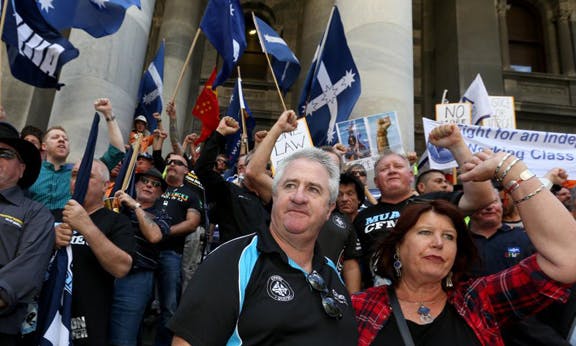CFMMEU demerger would set a dangerous precedent

When the Liberals start expressing concern for “decent, hard-working” unionists or workers, you know they’re lying. The only thing they’re ever concerned about is making sure workers are worse off. While this is obvious in the case of the new industrial relations omnibus bill, why would socialists see dangers in another bill that gives workers more rights in union amalgamations and demergers?
Currently, unions can amalgamate after a majority vote of members, but can demerge only during the five-year period immediately after an amalgamation or with special approval. This is clearly problematic. New arrangements passed in December will allow demergers at any time. Industrial relations minister Christian Porter told the Australian that it “will put the destiny of [unionists] ... who are dissatisfied back in their own hands”.
That’s good. Workers should be allowed to decide which other unions they amalgamate with, and demerge from, when they want to. And although amalgamation was controversial and opposed by many under the ALP-ACTU Accord in the 1990s, the process did allow for members to vote for or against the mergers. However, the legislation at the time unfairly limited the rights of members to demerge.
If there is no argument about the rights of workers guaranteed under the new laws, why should it be of concern for unions?
The Morrison government and its predecessors have not hidden their determination to rein in, if not smash, the Construction, Forestry, Maritime, Mining and Energy Union (CFMMEU). Late last year, the government was forced to drop its draconian anti-union Ensuring Integrity Bill, the focus of which was the CFMMEU, but would have affected every union. While the ACTU ran a weak campaign against the bill, it was One Nation’s tit-for-tat over other issues that forced the government to back down. Now Porter hopes that enabling the splitting of the union will rob the construction and maritime divisions of their industrial strength and assets.
The law allows the Fair Work Commission, on application, to approve a members’ ballot to withdraw after the current five-year period. There have to be grounds for the demerger, which can include the “illegal or unlawful” behaviour of one of the divisions. But because almost all current industrial action is illegal, with the construction and maritime divisions targeted and penalised under current laws, it’s a no-brainer that an application to hold a members’ ballot on those grounds, would—and must under the legislation—succeed.
Impetus for the new legislation hasn’t come from the members or industry, but within the leadership of the union itself: Michael O’Connor, head of the manufacturing section, and Tony Maher from the mining and energy division.
O’Connor and Maher have publicly hit out at the construction division, claiming it and Victorian leader John Setka have caused dysfunction and chaos within the union. Since November, they have resigned from national union positions and withdrawn their divisions from all national meetings and forums. All the while, however, they had secretly turned to Porter, one of the union’s main enemies, to frame the demerger legislation.
The construction division is under serious attack. For taking industrial action to defend its members, or even displaying the Eureka flag, it is facing $16m in fines issued by the Building and Construction Commission and the Federal Court, investigations by the Registered Organisations Commission and the Competition and Consumer Commission, not to mention police raids on its Australian Capital Territory and New South Wales offices. Now, with the connivance of some of the CFMMEU’s own leaders, it is to be dismembered by a government determined to strip workers of their rights and industrial strength.
As the Australian pointed out, if “the disaffected divisions break from the CFMEU, the government will examine further legislation that specifically targets its construction and maritime divisions”.
On one hand, we can welcome changes to allow unions to demerge when the members want. But this demerger move hasn’t come from a push by union members for more democracy. Rather, it’s a stalking horse by the enemies of militant unions, including those within the union movement itself, to destroy them. Like the attack on the Builders Labourers Federation (BLF) several decades ago, the process of demonising, isolating and then destroying a union is a tried-and-true ruling-class method of crushing militancy. The collaboration of other unions is often essential, as it was with the BLF, when most unions turned on the federation, cannibalising it. The predictable consequence was a weakening of the whole union movement and, ultimately, the parlous situation workers find themselves in today.
As the Electrical Trades Union national secretary Allen Hicks warned in the Australian: “Labor and the crossbench are kidding themselves if they think Christian Porter and the Liberal Party have the best interests of working people in mind. This hastily drafted plan designed to target the CFMEU will hit the entire movement”.